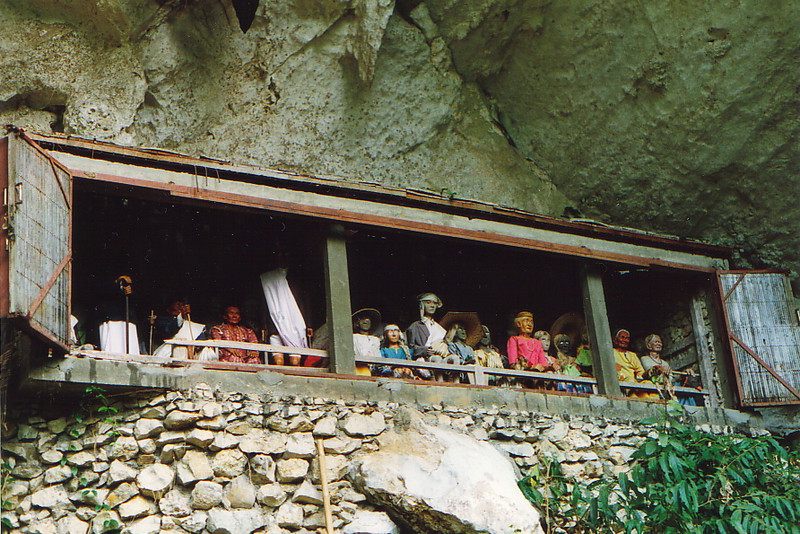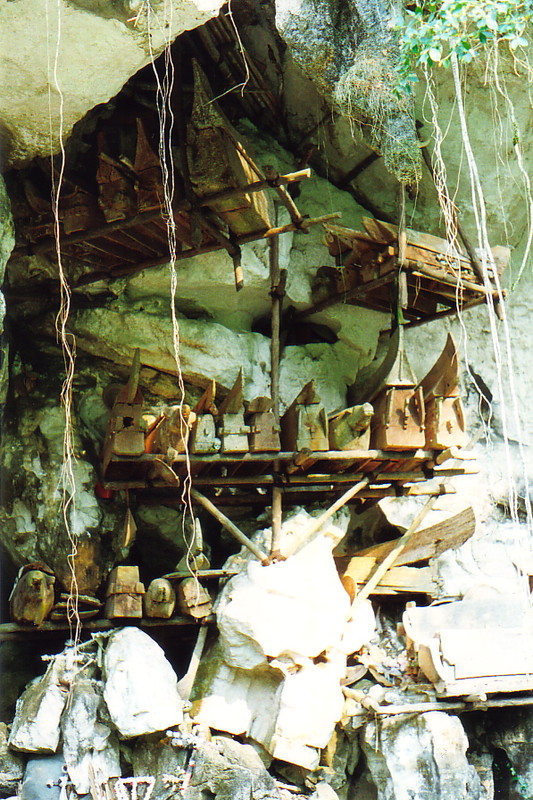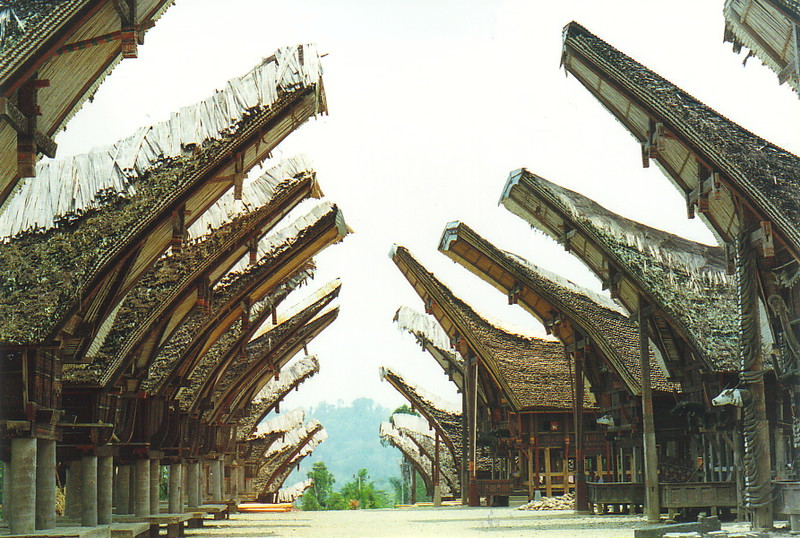Rose and I tackled the area around Rantepao as a team, by taking public transport to interesting spots and then exploring by foot. Despite the smoke hanging round the mountains from the forest fires in western Sulawesi, we spent two days wandering around a number of different areas, marvelling at the houses (which, after two days, became more familiar than interesting, but were still fascinating) and checking out the area's tourist-friendly sights and smells.
Without a doubt one of the most amazing things you can see in Rantepao is a Torajan funeral, but to put such an event in context it's good to explore the area first. There's plenty to see...
Lemo

Lemo is a classic cliff-grave and tau-tau site. There are balconies cut into the cliff-side where dozens of tau-tau figures stand, their arms outstretched in front of them as if in supplication. OK, there are plenty of tourist shops selling all sorts of toys and trinkets, and yes, the huts tucked away round the corner where the tau-tau are carved are little more than money-spinners, but the atmosphere of the place is pretty impressive; those tau-tau are disturbing whatever the environment.
Tilanga
Tilanga is apparently a waterhole, but it's too dried up to be of interest at this time of the year. However, I mention it not because of the sodden turf that bore as much resemblance to a swimming pool as Kuta does to paradise, but because of whom Rose and I met there. Dawdling about the path between Lemo and Tilanga were two English girls, Jenny and Sarah, with whom we fell into step and conversation. This world being as small as it is, it turned out that they were from Poynton, a tiny town north of Macclesfield where I used to work, and they knew some of the people from the office; Jenny and Sarah will crop up later in this story, and in retrospect it was very good luck that we met up together. Life would have been much harder without their peculiar knowledge of pharmacies...
Londa

Further along the road from Tilanga is Londa, one of the most touristy areas we visited, but also one of the most atmospheric. To understand Londa, you should know about the four types of Torajan graves: the first, the grave dug out of a cliff, is used when there is a convenient cliff in the vicinity; the second, the cave grave, is used if there is a handy naturally formed cave around; the third, the hanging grave, is hung from a suitably high spot, such as an overhanging cliff that's too dangerous to dig a cave into and where nobody will climb up to steal the body; and the fourth is the house grave, used when none of the other three can be built, where a hollow is dug in the ground, the body placed there, and a miniature tongkonan house is built over the grave.

Londa is a naturally occurring cave that's full of coffins, some extremely recently occupied, with a large collection of tau-tau guarding the entrance. Young men with kerosene lamps guide you through the winding corridors for a small fee, pointing out delightful sights such as the coffin that's broken open, allowing you to see the decomposing body inside, the skull that's still got a few tufts of hair stuck to it, the coffins of children stacked up high in the roof of the cave... yes, it's pretty gruesome at times, but it's all a part of the Torajan lifestyle, and once you get over your western hang-ups about death, it's fascinating.
Especially when there's a tiny tunnel through which you can crawl for ten metres to get from one side of the cave complex to the other. It seems we can add claustrophobia to the phobias that my travelling has helped tackle, because even though the tunnel was so small in places that we had to crawl single file on our bellies, I didn't freak out; even Jenny, a self-professed cave hater, managed to soldier through without panicking. I remember a particularly vivid part of Alan Garner's book The Weirdstone of Brisingamen where the heroes have to crawl through a rabbit-sized tunnel, and although it used to send me into a cold sweat to read it, I now find myself crazy enough to crawl down pitch-black tunnels through to chambers filled with rotting humans and babies' skulls. I never thought I'd end up saying something like that...
Palawa

Stone circles are another aspect of Torajan religion, with each stone standing for an important noble who departed this life. Some of the stone circles are ancient and covered in lichen, such as the one at Palawa, which is just down the road from a particularly impressive collection of tongkonan.
Bori
However the stone circle at Bori has been tidied up, cleaned and surrounded by a well-kept hedge and an immaculate garden, which rather spoils things... and then they charge you 2000rp for the privilege of going inside. So we opted not to pay, and instead settled for some snapshots from outside. Charging entrance fees is fine, but rebuilding the natural setting of a historical site to make it more appealing – and more hidden from non-paying passers-by – doesn't get my vote, at least not in this case.
Pa'piong
There was another cultural experience that promised much but failed to deliver: pa'piong. This local dish sounds scrumptious; buffalo meat (or chicken) is mixed with a bunch of vegetables and a spinach-like leaf, which is stuffed into a bamboo tube and slow roasted over a fire for three hours, before being served with black or red rice. It sounds great, doesn't it? Unfortunately we all thought it tasted pretty disgusting, which was a bit of a disappointment. Oh well, you can't win them all.